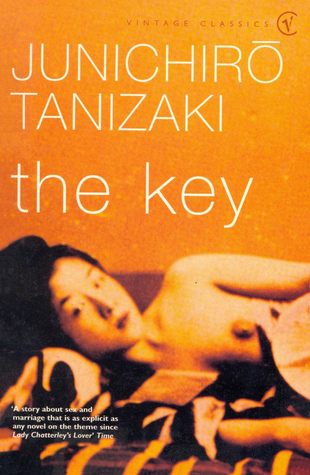The unnamed husband in Jun’ichirō Tanizaki’s The Key (1956, tr. Howard Hibbett, 1960) has long maintained a diary, though as he opens his first entry for the new year, he sets out that he intends to write on something he would never have dreamed about recording before.
I have always avoided commenting on my sexual relations with Ikuko, for fear that she might surreptitiously read my diary and be offended. I daresay she knows exactly where to find it. But I have decided not to worry about that anymore. Of course, her old-fashioned Kyoto upbringing has left her with a good deal of antiquated morality; indeed she rather prides herself on it. It seems unlikely that she would dip into her husband’s private writings.
Her morality is a mixed blessing, for while he has little doubt she’d spy on his innermost thoughts, it’s also in her nature to be less inspired in matters of congress. While he professes to love her dearly, and wishes to show such affection (“I never have to whip up my desire out of a sense of duty.”), he’s conscious that his age is becoming a factor in his inability to provide satisfaction. And although some distance has grown between them, there’s a sense she loves him too, although out of duty. But her subservience is not one that extends to servicing his more expansive ideas of gratification.
Even now, after more than twenty years of marriage, with a daughter herself old enough to marry, she refuses to do more than perform the act in silence. Never to whisper a few soft, loving words as we lie in each other’s arms – is that a real marriage? I am writing out of frustration as never having a chance to talk to her about our sexual problems. From now on, whether she reads this or not, I shall assume that she does, and that I am talking to her indirectly.
It wouldn’t be a surprise that she would be reading for he appears to have invited her by carelessly (i.e. deliberately), leaving the key to the drawer where it’s kept. However, The Key isn’t a one sided telling, and Ikuko has decided to maintain a record of her own (“someone like me, someone who doesn’t open her heart to others, needs to talk to herself, at least.”), and so the novel follows their alternating entries as they carefully and manipulatively set down their lives and thoughts in detail, talking to themselves, but both perhaps secretly hoping the other is reading.
Has he changed his mind and decided he wants me to read it? Perhaps he realizes I’d refuse if he asked me to, so he’s telling me: ‘You can read it in private – here’s the key.’ Does that mean he thinks I haven’t found it? No, isn’t he saying, rather: ‘From now on I acknowledge that you’re reading it, but I’ll keep on pretending you’re not’?
One evening, while she’s subdued by an excess of brandy, he seizes the opportunity to act out his desires, an act that excites her as much as it does him, even though in her haziness she imagines it to be Kimura, their daughter Toshiko’s prospective husband (although she doesn’t appear all that interested in him).
For some time I have felt that Toshiko keeps aloof from Kimura. Is it because she thinks he is too attentive to her mother? That notion had also occurred to me; but I decided that I was being jealous, and tried to dismiss it.
Trying is of course not the same as doing, especially when he finds jealousy stimulating. The thought of his wife lusting after Kimura therefore only heightens his jealousy and the only way to tap this energy is to push her further toward him, effectively unlocking her own trapped desires long suppressed in that “old-fashioned Kyoto upbringing.”, and driving the story toward more devastating circumstances.
While The Key may have been a shock to society upon its release in mid-50s Japan, its relatively explicit nature would be hard-pressed to make ripples today. More than just erotica; it’s a taut psychological study of a love triangle with a woman in the middle experiencing and embracing a hitherto unknown sexual vigour. That the couple’s personalities are only revealed through their diary entries, as are the younger pair, there is much ambiguity created in determining the truth from the manipulative elements expressed purely for their audience.
It’s a multi-layered feat of literary voyeurism, as we, the reader, look on while the characters themselves do the same. In exploring the relationships — and questionable motives — between all characters, we see the stale relationship of an older couple erupting in fits of lust between people with the capacity yet to love and a sense that that honesty and clear communication may be the key to a relationship, rather than keeping it all locked away.

A nice take on this one. Have you tried ‘Quicksand”? I think that’s an even better take on erotic entanglements.
I’ve not. This is my first Tanizaki.The only other thing I’ve got sitting on my shelves is the essay, In Praise of Shadows. But when the bookshops are finally allowed to reopen I’ll look out for it, or whatever else they have.
Well, ‘In Praise of Shadows’ is great, too. I actually did a month or so of Tanizaki reading a couple of years back, and I think I’ve reviewed about sixteen(?) of his books 🙂
I didn’t even realise there were that many. Something to look forward too.
I saw that he would likely have been Japan’s first Nobel laureate (1964) had he not died the year after it became a toss-up between him and Sartre (who didn’t want it).
Yes, one of a few near misses, including Mishima, of course (whose suicide was in part linked to Kawabata’s win…).